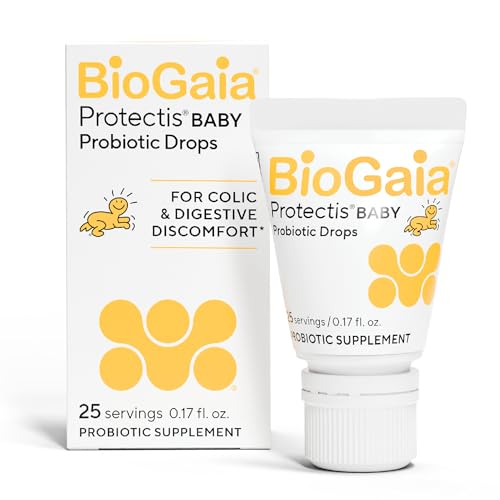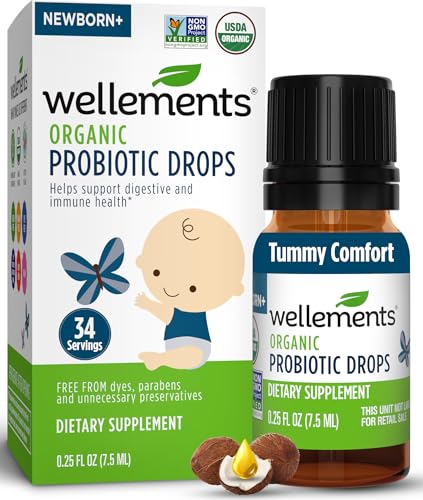As a parent, you always want the best for your little one, especially when it comes to their health and wellness. One important aspect of this is their gut health, which can greatly affect their immune system and overall digestive function. That’s why introducing probiotics to their diet from a young age can be a great way to support their health.
According to the American Academy of Pediatrics (AAP), there is some evidence in otherwise healthy infants and young children to support the use of probiotics early in the course of diarrhea from acute viral gastroenteritis and that use of probiotics reduces its duration by 1 day (1).
But with so many options available, it can be overwhelming to choose the right one for your baby. We will explore the best probiotics for infants and what to look for when selecting one for your baby. From strains specifically selected for digestion and nutrient absorption to those that support immune system development, we hope you’ll find the right probiotics here to meet your baby’s needs.
Our Top Picks
- Best Infant Probiotic Drops: BioGaia Protectis Baby Probiotic Drops
- Most Affordable Infant Probiotics: Gerber Good Start
- Best Natural Probiotics For Infants: Wellements Organic Probiotic Drops
- Best Infant Probiotic With Vitamin D: Culturelle Probiotics
- Best Infant Probiotic Powder: Seeking Health ProBiota Infant Powder
- Best Probiotic For Infants With Reflux: Lovebug Baby Probiotic Drops
- Best Probiotic For Infants With Constipation: Mommy’s Bliss Baby Probiotic Drops
- Best Probiotic For Infants With Gas: MaryRuth Organics Probiotics
In This Article
HappyBabyHub’s Best Probiotics For Infants Picks
BioGaia Protectis Baby Probiotic Drops – Best Infant Probiotic Drops
- Reduces/prevents colic in babies
- Does not require refrigeration
- Easy-to-use plastic bottle dispenser
- Helps lessen spit-ups
- Not the easiest to administer
Clinical trials have confirmed the effectiveness and safety of these drops in improving the digestive health of babies and older children. The drops contain L. reuteri Protectis, a specially selected probiotic strain that supports digestive health.
Using the drops is simple and hassle-free, requiring only 5 drops to be administered once a day. Furthermore, they are free from dairy, soy, artificial colors, and flavors, making them an excellent choice if you are looking for natural ingredients. Plus, each bottle contains a 24-day supply.
Gerber Good Start – Most Affordable Infant Probiotics
- Relieves constipation
- Very affordable
- Easy to give to babies
- Works for gas
- These will not eliminate colic, so you also may want to also get some baby colic tea for those rough days
This probiotic is a great affordable option for parents wanting the best value for their buck. The key ingredient in the Gerber Good Start is L. reuteri, a probiotic strain that has been clinically proven to reduce colic, excessive crying, and frequent spitting up in babies.
The probiotics in the Gerber Soothe drops are comparable to those found in breast milk, ensuring that infants receive the same benefits that they would from breastfeeding. Clinical studies have shown that using Gerber Good Start Soothe Comforting Probiotic Drops can reduce the crying duration by up to 50% and spit-up frequency by up to 50% in as little as 2 weeks.
The Gerber Soothe drops are incredibly easy to use, with just five drops required each day. Simply shake the bottle firmly before use and tilt it at a 45-degree angle to generate a drop gradually. The drops can be applied topically, combined with breast milk or formula, or administered with a spoon.
Wellements Organic Probiotic Drops – Best Natural Probiotics For Infants
- Tasty flavor
- Easy to use with the provided dropper
- Organic ingredients
- Great vitamin option
- The quantity is small
Made from the finest natural ingredients, these drops are free from preservatives, ensuring that your child receives only the best, most natural ingredients.
Using the Wellements Organic Probiotic Drops is simple and convenient. Before each usage, simply give the bottle a good shake and apply 5 drops to your child’s nappy, pacifier, spoon, breast milk, or formula.
One important thing to keep in mind is that after opening, the product should be refrigerated to ensure maximum potency and effectiveness.
Culturelle Probiotics – Best Infant Probiotic With Vitamin D
- Convenient to feed, can be given directly or in milk or formula
- Comes with a dropper attachment
- Very effective
- No refrigeration needed
- A tiny bottle which makes the product expensive
With probiotic drops made from the most extensively researched probiotics, Bifidobacterium animalis subsp. lactis BB-12 and Lactobacillus rhamnosus GG (LGG), you can be sure that your baby is receiving the best possible care.
Using this probiotic is easy and convenient. Simply shake the bottle before use and apply 5 drops once daily to a spoon, a bottle, or directly to your baby’s mouth while nursing. The dropper cap makes it easy to dispense the drops, and the formula is designed to interact naturally with your baby’s body.
This formula is safe and effective, and is free from drugs, peanuts, sugar, non-GMO, gluten, and dairy, making it the perfect complement to your baby’s healthy lifestyle. This probiotic also comes with a 30 day supply.
Seeking Health ProBiota Infant Powder – Best Infant Probiotic Powder
- Easy-to-use powder
- Great for squirmy babies
- Helps with gas
- Helps with reflux
- A bit pricey
The ProBiota Infant Powder contains five bifidobacterium species that are commonly found in a newborn’s gastrointestinal tract, which helps to boost the body’s natural defenses and maintain healthy digestion. With more than 10 billion organisms per quarter teaspoon, this probiotic is an excellent way to support your baby’s digestive system and ensure they are getting the most from their meals.
Not only is ProBiota Infant Powder easy to use, but it is also versatile, as it does not require cold storage, making it convenient for parents on the go. Simply add the powder to your baby’s meal, and you’ll be providing them with the digestive support they need to thrive.
Lovebug Baby Probiotic Drops – Best Probiotic For Infants With Reflux
- Helps with digestion and reflux
- You don’t need to use it a lot for it to do its job
- Immediate gas relief within 2 hours of usage
- The multiple strains make a huge difference
- The dropper doesn’t work well. It takes forever to get one drop
Lovebug understands the unique needs of infants and has developed a potent blend of six strains of probiotics that are specifically formulated to address probiotic deficiencies, which can lead to a range of issues including colic, reflux, diarrhea, constipation, weakened immune systems, eczema, and digestive distress.
Lovebug’s probiotic is made in the USA using the finest natural ingredients, certified by the USDA. It is free of the eight main allergens, non-GMO, and free of any chemicals, preservatives, synthetic colors, or flavors. You can have peace of mind knowing that your child is receiving the safest and most effective probiotic available on the market.
Mommy’s Bliss Baby Probiotic Drops – Best Probiotic For Infants With Constipation
- Easy-to-read dropper
- Small dose amount
- No fussy baby
- Helps regulate the baby’s tummy issues
- Can’t be given directly
The Mommy’s Bliss Probiotic Drops is a product designed to help improve your baby’s immune system and offer relief from digestive issues like colic, gas, and constipation. The product contains only two ingredients, maize oil and Lactobacillus rhamnosus GG, a probiotic strain that has been the subject of over 800 scientific studies worldwide.
With just 5 drops a day, you can see a noticeable improvement in your baby’s digestive health. The dropper makes it easy to administer the drops directly to your baby’s mouth while nursing, mix it with breast milk or formula, or even give it straight via a spoon.
However, it’s important to note that you should avoid adding drops to hot meals or infant formula as high temperatures can harm the living probiotics. After opening, be sure to store the product in the refrigerator to extend its shelf life. Each bottle contains 10 ml or 0.34 Fl Oz and provides 30 servings.
MaryRuth Organics Probiotics – Best Probiotic For Infants With Gas
- You don’t have to refrigerate it, so you can keep it on the table next to you
- Glass bottle
- Easy to mix with anything
- No smell
- Read instructions well before using
The probiotic drops offered by MaryRuth are not only non-GMO and vegan but they are also certified organic by the USDA. They are free from nuts, gluten, wheat, soy, corn, sugar, and dairy, making them a suitable option for even the most sensitive individuals.
The probiotics in the drops have been specifically selected for their positive impact on digestion and nutrient absorption. Bifidobacterium lactis has been shown to enhance the development of the immune system, while Bifidobacterium infantis helps to maintain the integrity of the digestive tract.
These drops can be taken directly or added to a beverage and should be started with one drop per day and gradually increased over a few weeks, with a maximum recommended dosage of 5 drops per day.
How To Choose The Best Probiotics for Infants?
- Strains: Look for probiotics that have specific strains that target your baby’s specific needs, such as colic, gas, constipation, or digestive distress.
- CFU Count: Colony Forming Units are the standard measurement used to quantify the number of probiotics present in a supplement (2). The higher the CFUs, the higher the probability that the beneficial probiotics will successfully reach and positively impact your baby’s digestive system.
- Dosage: Check the number of organisms per serving and choose a product that contains the appropriate amount for your baby’s age and weight.
- Safety: Choose probiotics that are free of harmful ingredients and contaminants, such as sugar, gluten, dairy, and peanuts. Also, make sure the product is USDA-certified organic.
- Ease Of Use: Look for probiotics that are easy to administer, such as a dropper or powder forms, and that can be added to breastmilk, formula, or solid foods.
What Are Probiotics?
Probiotics are live microorganisms (bacteria or yeast) that are similar to beneficial microorganisms found in the human gut (3). When consumed in adequate amounts, they can provide health benefits by restoring the balance of good bacteria in the gut and improving gut function.
When Should I Start Giving My Baby Probiotics?
Some newborns, such as those who are preterm, have cancer, heart problems, or weakened immune systems, may need close monitoring before using probiotics.
To ensure the safety of your baby, carefully read the manufacturer’s instructions and discuss the necessity and type of probiotic with your doctor. Ideally, you can start giving your baby a probiotic supplement as soon as they are born and continue for the next three years. This is because their immune system and gut flora are rapidly developing during this time.
What Are The Benefits Of Probiotics To Babies?
- Probiotics can help promote healthy gut bacteria, which can relieve symptoms of digestive issues such as colic, constipation, and diarrhea (4)
- Probiotics can help improve the balance of good bacteria in the gut, which can support the development of a strong immune system.
- Probiotics can aid in the absorption of nutrients from food, leading to better overall nutrition
- Some research suggests that taking probiotics during pregnancy and early childhood may reduce the risk of developing allergies
- The gut-brain connection is well-established, and some studies suggest that probiotics may have a positive impact on mood and mental health
What Are The Side Effects Of Probiotics In Babies?
Probiotics are generally considered safe for babies and have few side effects. Commonly reported side effects to include mild digestive symptoms such as bloating, gas, and diarrhea, but these typically go away within a few days (5). In rare cases, probiotics can cause an allergic reaction, and some infants may experience skin rashes, hives, or difficulty breathing.
If your baby experiences any of these symptoms, stop giving them probiotics and contact your pediatrician immediately. Before giving your baby any probiotic supplement, it is important to discuss it with your pediatrician to determine if it is appropriate for your baby and to ensure that the probiotic supplement you choose is safe and effective.
Are Probiotic Supplements For Babies Safe?
Pediatricians generally consider probiotic supplements safe for babies. However, it is essential to discuss any supplements with a pediatrician before giving them to an infant. Probiotics are generally considered safe when taken in appropriate amounts, but every baby is different and may react differently. However, It’s essential to follow the instructions and dosage recommendations on the probiotic product label and to always consult with a pediatrician before giving any supplement to a baby.
Which Strands Of Probiotics Are Most Important For My Baby?
The most important strains of probiotics for babies are Bifidobacterium and Lactobacillus (6)(7). These strains are commonly found in a newborn’s gastrointestinal tract and have been shown to support digestive health, immune system development, and nutritional absorption.
Bifidobacterium lactis can help with immune system development, Bifidobacterium infantis supports the integrity of the stomach lining (8), Bifidobacterium bifidum boosts nutritional absorption, and Lactobacillus reuteri may support emotional regulation.
Can Probiotics Make Baby Fussy?
There is limited research on the effects of probiotics on baby fussiness. However, some studies have shown that probiotics can help reduce fussiness and improve gut health in babies. However, every baby is unique and may react differently to probiotics. It is always best to speak with your pediatrician before starting your baby on any new supplement.
Can Baby Probiotics Help With Acid Reflux?
As many as 40% of infants between the ages of two and four months may experience reflux, a common gastrointestinal disorder in the first year of life (9). Although this condition becomes less frequent as babies grow older, frequent regurgitation and acid reflux can negatively impact the health of newborns and may lead to additional health issues, such as failure to thrive.
The effectiveness of probiotics in treating acid reflux in newborns is currently not well-researched. Nevertheless, the results from limited studies are promising, and when taken as directed, probiotics may help alleviate symptoms related to the stomach. It is crucial to find the right strain to treat the condition you are targeting when using probiotics.
Do Probiotics Really Help With Colic In Babies?
The scientific community is still researching the effects of probiotics on colic in babies, and the results have been mixed. Some studies have shown that certain probiotic strains can alleviate colic symptoms, while others have found no significant improvement. However, probiotics are generally considered safe for infants and may offer other health benefits, so they may be worth trying if you’re looking for ways to help your baby with colic (10).
Does My Baby Get Probiotics In Breast Milk?
Yes, breast milk contains natural probiotics that can benefit a baby’s digestive and immune system development. However, some babies may still benefit from additional probiotic supplementation, especially if they are formula-fed or have certain health conditions.








